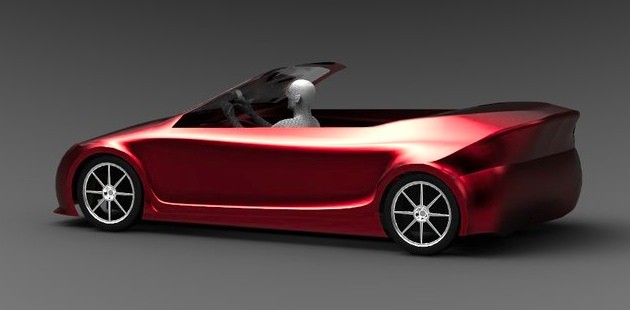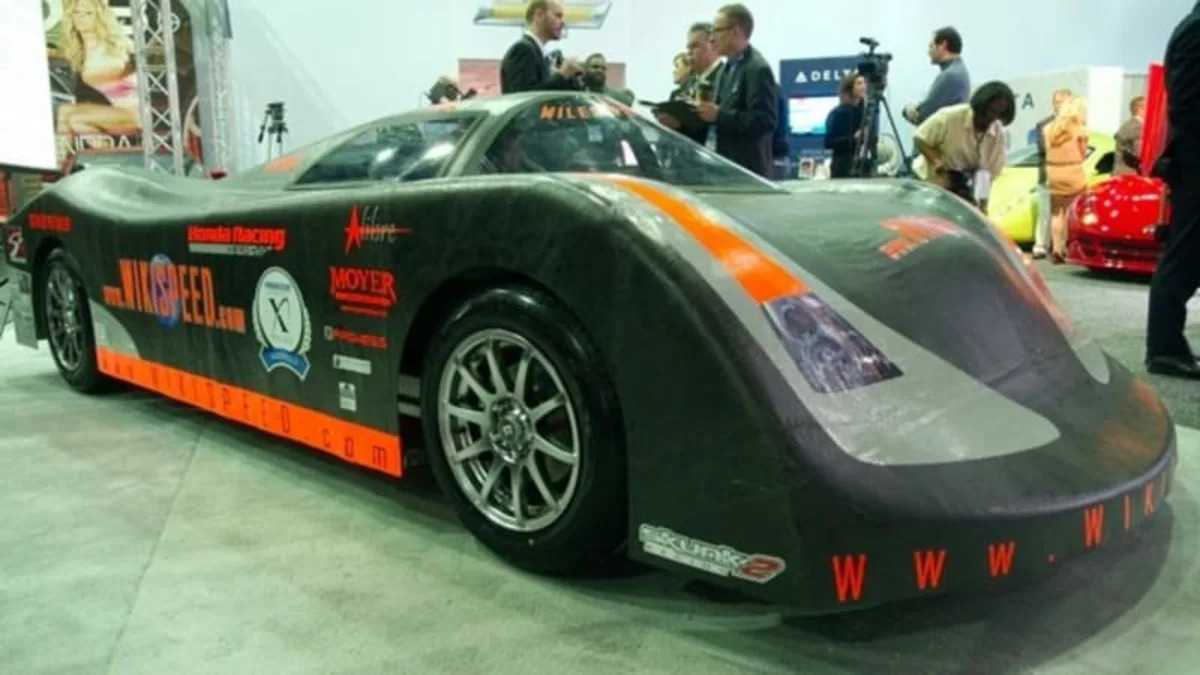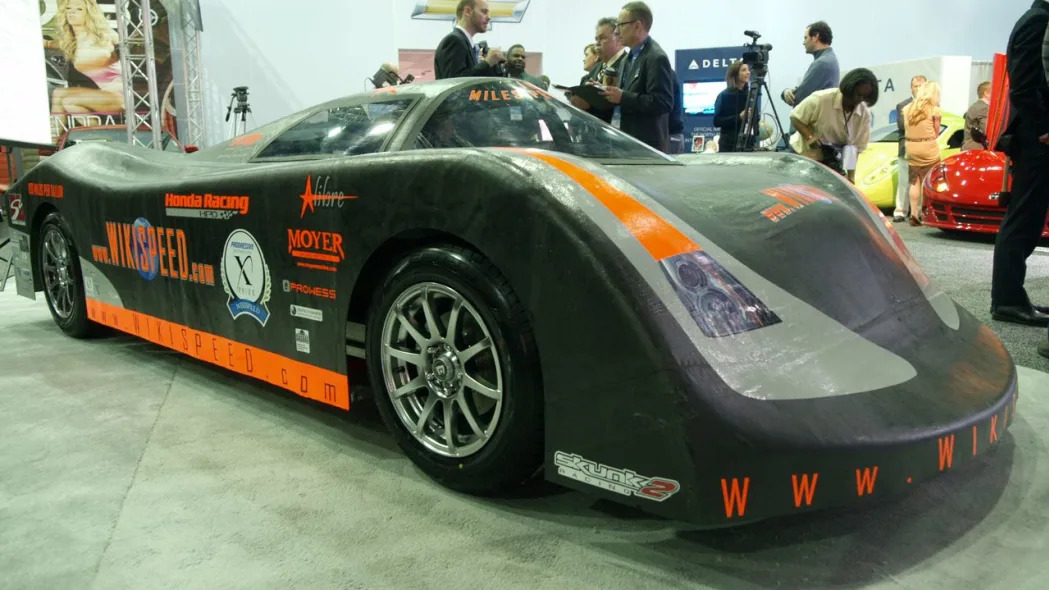Wikispeed – Click above for high-res image gallery
The last time we saw the vehicle that the Wikispeed team is working on, it was a big orange rectangle (see here). At the 2011 Detroit Auto Show, the group of volunteers is still not ready to show off a finished product, but the SGT01 vehicle is progressing quite nicely, especially considering that the team "tied for 10th" in the Automotive X-Prize. After the disappointing X-Prize finish, team founder Joe Justice said, "We thought we shouldn't just stop. We should see if there is a market for this product." And that's what they did. That loss didn't dampen the group's spirits; in fact, the number of volunteers working on the projet has grown since the X-Prize ended.The latest version of the SGT01 is clad in a carbon fiber-skinned honeycomb-core aeroshell that makes the car supremely light. Given that another of Wikispeed's tentpole ideas is to make the car modular, there is no official weight of the production car – it'll be totally different depending on whether it's a sedan, SUV or a sportscar, all options that Wikispeed believes it can build on the rectangular chassis – but the car as it weighs just 1,404 pounds. Justice said, "I think we can get the weight down by the time we get these cars out." One thing that will add weight: real head- and taillights. The current ones are just stickers. Find out more about the car and the team after the jump.
The modular set-up means things like the suspension, powerplant and the front end can be replaced quickly. "In about the time it takes to change a tire, we can swap in an powerplant," Justice said, metioning gasoline, diesel, methanol or battery electric as possibilities.
The car is being designed with a gas engine in mind though. Given the simulated miles per gallon ratings of 114 highway / 104 city using the EPA's Urban Dynamometer Driving Schedule models, the car has a 400+ mile range from a tiny, four-gallon tank. Don't count on the car's expected 0-60 time of five seconds and top speed of 149 miles per hour to be that efficient, though.
Justice said during the Wikispeed press conference in Detroit that one of the results of participating in the X-Prize was "several tens of thousands of dollars" from Roush Engineering. That money was put to good use by the team's volunteers to bring the car to Detroit, speedily going from CAD files to carbon in just three weeks. Most surprisingly, most of that time was spent on waiting for a supplier. Justice said the work took just three days and cost $1,000.
Low expenditures like that mean that, shoud the car ever come to market, Wikispeed just might be able to hit its $20,000 target price. Right now, Wikispeed is offering kits for $28,886, but if more than 250 are sold in 2011, the cost drops to $17,995 and everyone who ordered one gets the difference rebated. Interested?

The team is active on Facebook (where the above rendering appeared) and on its own website.
PRESS RELEASE
WIKISPEED Debuts SGT01, 100 mpg Car at the 2011 North American International Auto Show in January
Former 2010 Progressive Insurance Automotive X Prize Contestant Updates Sedan for Consumer Market
SEATTLE, Dec. 17, 2010: WIKISPEED, a collaborative team of auto enthusiasts who placed in the top 10 in the Mainstream Class during the 2010 Progressive Insurance Automotive X Prize, is debuting the SGT01 sedan at the 2011 North American International Auto Show (NAIAS) in January. The innovative and dynamic SGT01 prototype is a light-weight sedan that reaches 104 mpg in the city and 114 mpg on the highway (fuel economy based on actual fuel consumption during simulation of EPA city and highway driving cycles).
WIKISPEED utilizes automotive-industry innovations, an agile development process, and over 50 experts and volunteers around the world to create a modular sedan that outperforms current models on the road. Advancing from the prototype created for the X Prize, WIKISPEED is introducing a new aerodynamic body design and extra features for the SGT01 for the consumer market.
WIKISPEED SGT01 Automotive Debut
The SGT01 runs on regular gasoline, meets all road-safety regulations, and is modular in design, making parts interchangeable including the drive train, suspension, safety structures, body design, and interior from two to four seats. The design is so flexible that even the engine can be switched from gasoline to electric in about two hours. The new SGT01 has been fabricated by a team in Hillsdale, MI. The production prototype that will be on display at NAIAS uses the 100 mpg X Prize mechanicals with a new aero-package and improved ergonomics, evolving from race car to road car. Since the SGT01 is modular, the body style will be changed during the show.
SGT01 Features:
1.8 liter in-line 4 engine
5-speed automatic transmission
Adjustable, cushioned front seats, carbon-fiber rear seats
Ventilated disk brakes, front and rear
20 cubic feet of trunk storage
Carbon fiber–skinned honeycomb-core aeroshell for ultimate in strength, energy absorption, and weight savings
Airbag-system sensor strategy produced by Roush Automotive Consulting
Replaceable/upgradeable impact barriers front, side, and rear. Chassis digitally validated to exceed side- and frontal-impact requirements with 5-star equivalence; further safety validation pending via Roush Automotive Consulting.
About WIKISPEED
Based in Seattle and led by Joe Justice, WIKISPEED is a collaborative team of over 50 experts and volunteers dedicated to offering ultraefficient, ultra low-cost, mass-production road-legal vehicles. In 2010 the team's SGT01 prototype placed in the top 10 in their class out of 136 cars overall in the Progressive Insurance Automotive X Prize.
WIKISPEED is sponsored by Alibre Design, Ampstech, Kenworthy Machine, Mecsoft and Skunk2 Racing, with consulting donated by Lotus Engineering and Hondata. Additionally, Irish Car Hire, South Seattle Community College, and the University of Washington have contributed parts or time. The experts at Honda Racing Line have generously donated support for the power train and suspension systems, and Delta Wing Racing has contributed to the aerodynamic analysis of the body design.



Sign in to post
Please sign in to leave a comment.
Continue